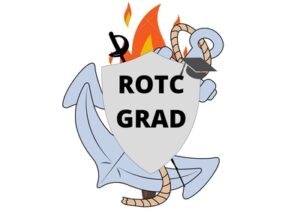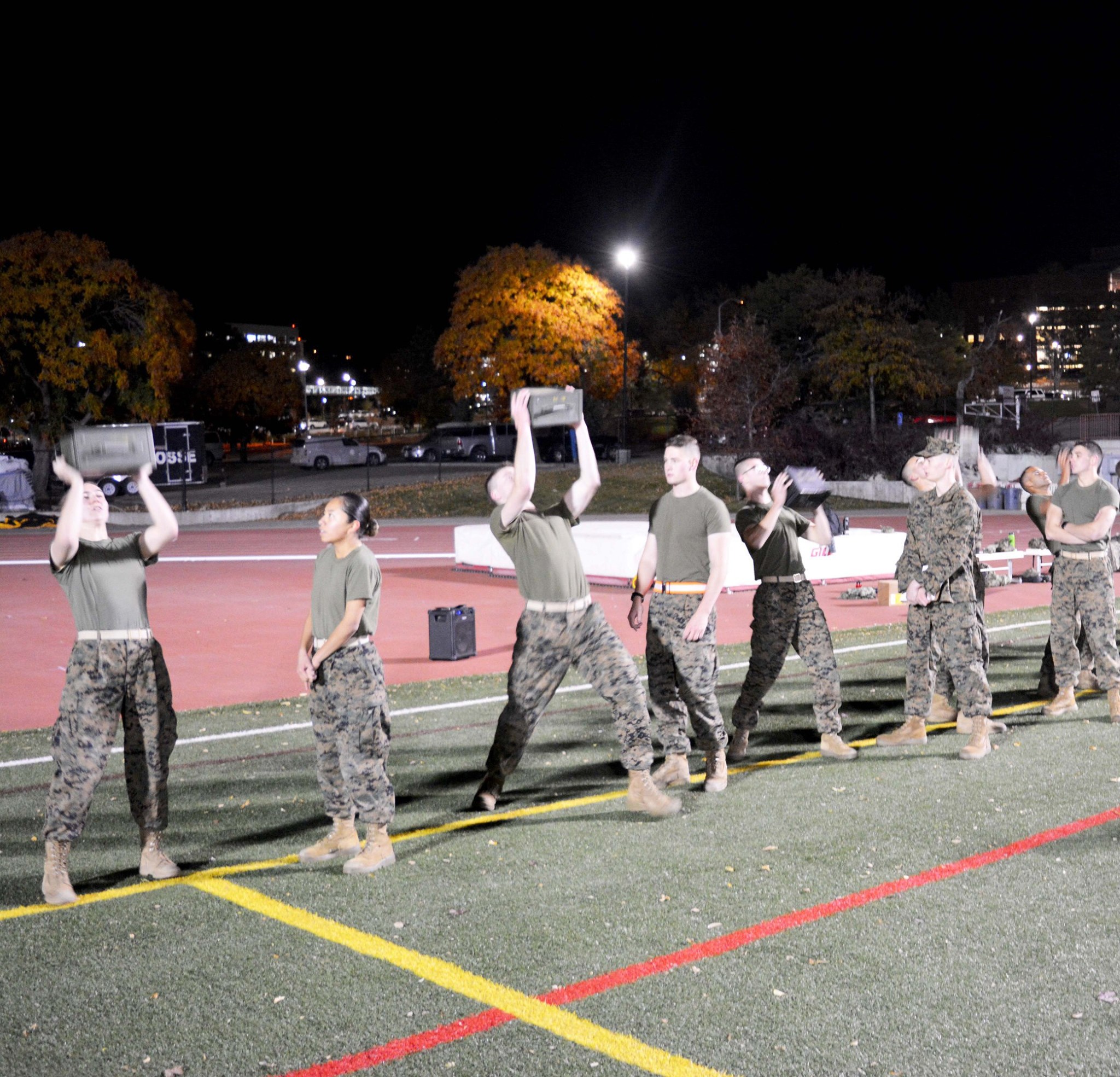
Introduction
When I was in high school, I knew I wanted to join a branch of the military that made me a better person. I also knew I wanted to be part of one of the best organizations in the military. After I did some research and learned about the Marine Corps, my next question was whether or not I could go to college while serving.
After talking to some recruiters and talking to them about my career goals, I was put in contact with an officer recruiter in the Department of the Navy. There’s actually no such thing as Marine ROTC, it falls under Navy ROTC (NROTC). While you attend the same NROTC unit as your Navy counterparts, there’s actually some big differences in the training you go through.
What is Marine NROTC like in a nutshell?
Marine ROTC is the same as Navy ROTC (NROTC) because both types of midshipman train at the same unit, workout together, and receive leadership classes alike. Marine Option midshipman will take different naval science classes and train for Officer Candidate School going into their senior year. Navy Midshipman are required to study demanding fields on the Navy Tier List while Marine Officers can major in anything they want.
Differences and Similarities Explained
For someone completely new to how the military works: Navy officers can be in career fields such as Surface Warfare (ships), submarines, jet / helicopter pilots, and Navy SEALS. Marine Officers will go into career fields such as ground infantry, intelligence, combat engineers, pilot, logistics, supply, communications (radio etc), cyber security and many others. The active military lifestyle and standards vary dramatically across the two branches. If you want to see even more comparative differences, check out this article.
I honestly had no clue what differences there were between all the reserve units on campus. I also realized there’s almost no information on it as well, which is why I’m writing this article to help you get a better understanding. Take a look at some of these points below.
Marine Options physically train more (and harder)
Navy options don’t go to OCS (officer candidate school). They go to a few different summer trainings that slightly simulate a boot camp environment but it’s nothing to stress over. Marine Options train almost 2-3 times a week in the spring semester to prepare themselves in their junior year for OCS. Freshmen and Sophomore members still partake in these events so they are more-than-able to meet the standard going into their junior year.
Even Navy Midshipman got their fare share of tough workouts. If you really want to know how hard NROTC is, this article will share all my personal experience and that of my friends.
Marine Options can major in anything they want (and change their major more easily)
Navy options have to choose a field of study on the Tier List. When I applied even as a Marine Option, I had to pick a major on the Tier List (Mechanical Engineering, Computer Science, Electrical Engineering, Physics, Calculus, Oceanography) to be competitive but then changed it when I got to college to Geography (not on the tier list). I wouldn’t have been able to do that as a Navy Option because they want midshipman studying something related the Navy. The Marine Corps just cares that you have a degree.
Most of my Marine friends studied Philosophy, Business, Political Science, and History.
Marine Options and Navy Midshipman still take the same weekly unit training classes
Every Thursday from 3-5pm, my unit conducted an all-hands lab event. During this time, we received classes on Combat Casualty Care, Room Clearing, Martial Arts, and frequently had guest speakers from the Navy talk to us about submarine life, explosive ordnance disposal, and various leadership topics.
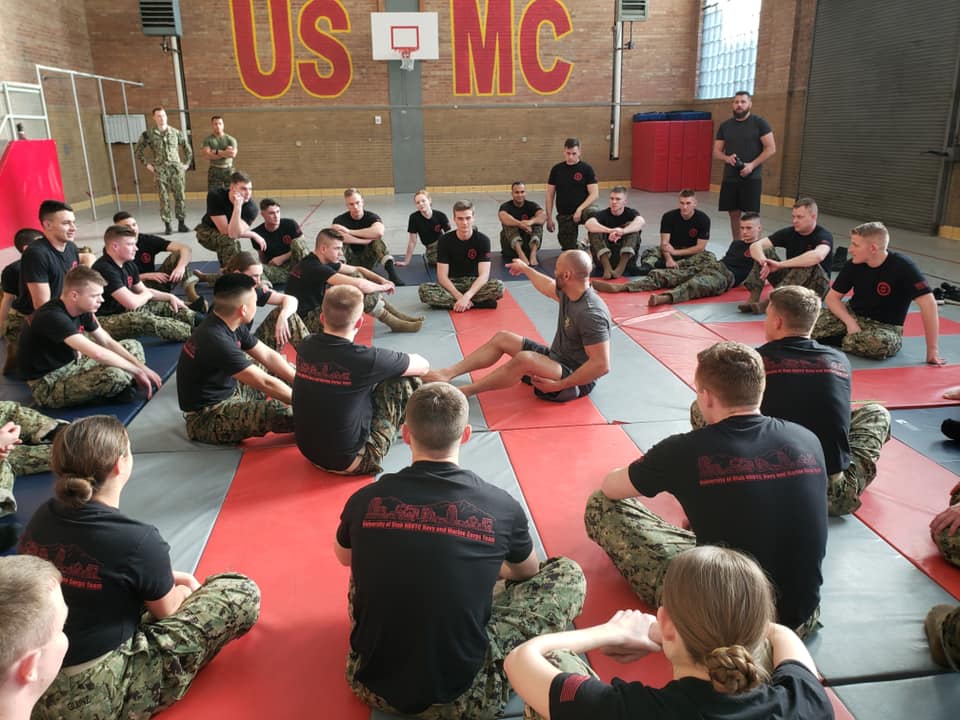
Most of these lab events were focused intensely on Navy related things, which I felt was a waste of time for the few Marine Options. Rarely did we have something that was pertaining to us but at least it was only a couple hours a week.
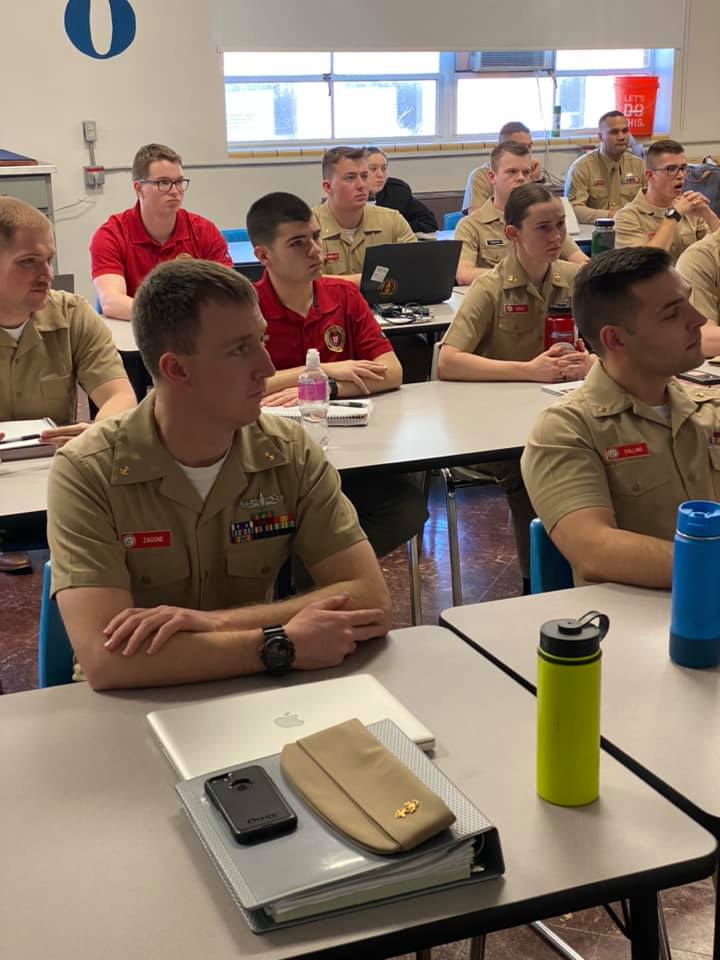
Marine Options go to different summer training exercises
If you get selected for an NROTC scholarship (Navy or Marine) before you arrive in college, you go to a month long event from June to July called CORTRAMID (carrier oriented training for Midshipman). This is a week with each community in the fleet for four weeks (Ship life, aviation and riding on aircraft, submarines, and one week in the field with the Marines). It’s an awesome time to experience what military life is like in each of these communities to give you a better understanding of it.
During sophomore year summer, most Navy midshipman spend a week on a ship or with a community in the Navy they want to explore more. As a Marine Option, I spent a week with the infantry, shot guns with them, practiced martial arts, and learned about combat leadership. It was one of the most transformative weeks for my professional career and I grew a lot as a person and a leader.
Junior year Marine Options go to Officer Candidate School for OCS (this is the officer version of boot camp).
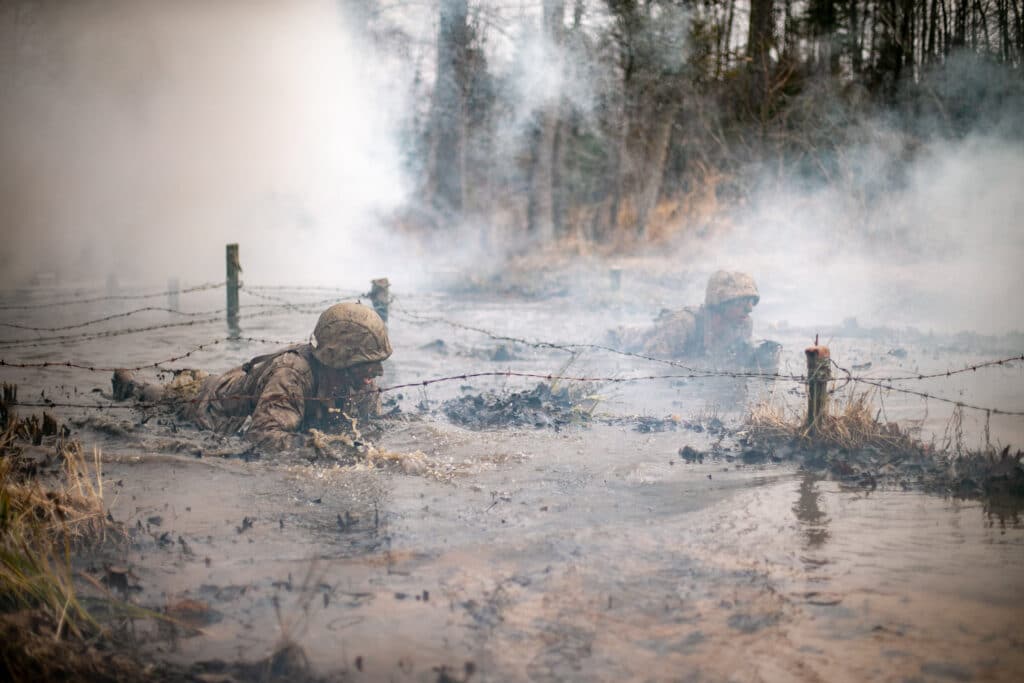
For more info on how to prepare for this, check out my video and blog article here. Navy Midshipman go to Sea Trials, where for a few weeks, a Navy chief yells at them to run around and do drill on board a ship. There’s some other aspects to it, but that’s essentially what the experience is like from what I’ve heard.
Personal Opinion: The Marine Options at my unit were way closer than the Navy midshipman. Most of the Navy guys focused intensely on their difficult majors (and for good reason) and didn’t spend a whole lot of time getting to know everyone else or hanging out outside the unit. There were also some prior enlisted Marines going through the program to also become officers and they were some of the highest performing leaders I’ve ever met and they shaped me to become a better person.
Is it the best Marine Officer Commissioning Route?
When I got the fleet after graduating from my university, I was surprised to find out NROTC wasn’t the only way to commission as a Marine Officer. In fact, NROTC is one of the least common ways people enter this branch of service as an officer. Looking back at my experience, I grew as a leader and learned management skills at my unit that I would have never gotten in any other field of study or class. I am extremely grateful for that. However, my NROTC unit kept me extremely busy, and I let them. I even changed my major from computer science to geography because I didn’t have enough time each summer to take summer classes and complete a major in four years. With another commissioning source which I’ll talk about below, I wouldn’t have needed to switch.
Other Marine Officer Commissioning Routes:
- Platoon Leaders Course (PLC): This is a lightweight version of NROTC with just aspiring Marine Officers. You train a couple times a month with your local officer recruiter but most of your Officer Candidate School (OCS) prep is up to you. NROTC Marines have dedicated OCS classes every week but PLC guys don’t so they don’t feel as prepared. PLC guys also have to go to 6 Week Juniors OCS and 6 Week Seniors OCS two consecutive summers in a row. But they get to study anything they want and don’t have significant time commitments like NROTC (but also know they don’t get full tuition coverage like NROTC)
- OCC (Officer Candidate Class): This is for civilians who graduate college and never join an officer commissioning source like PLC or NROTC. Being part of OCC means you apply for the 10 week OCS and go straight into it once accepted (usually the winter class) and the immediately to The Basic School (TBS) after OCS. NROTC and PLC guys go to OCS their junior year not senior year so they will have one more year of college before going to The Basic School (TBS).
- Naval Academy: As an aspiring Marine Officer, I really don’t recommend this route unless you’re awesome enough to get accepted and really dig the Navy traditions. You don’t go to OCS if you go to the academy because you’re already in a high discipline environment all four years. I don’t recommend the academy as a Marine Officer because it doesn’t give you a leg up at The Basic School (TBS) and you’re on the same playing field as everyone else competing for the specific job they want to have in the Marine Corps. It’s also extremely time consuming and you don’t get summer breaks like other schools.
Can I switch in or out of being a Marine Option in NROTC?
You can easily switch out of being a Marine Option to be a Navy Midshipman if you have a competitive major on the Tier List. It will almost feel like you have to reapply for the NROTC program but I had a few friends that made the switch both ways. Switching from Navy Midshipman to Marine Option is way more competitive since it’s a smaller branch with high personal standards, and you can’t switch if your a Junior or above in college.
It really depends on your unit. You have to really show them you’re committed to switching and have competitive scores to get selected again. If you don’t get it, you should still be able to keep your original scholarship. If you show up to NROTC without a scholarship, it’s easier to switch since they haven’t already invested money in you. The process takes several months so I recommend knowing what you want to do first and sticking with it.
How do I apply for Marine NROTC?
The easiest way to apply is to ask your recruiting office to put you in contact with an officer recruiter, not an enlisted one. Often times, high schools will have dedicated officer recruiters that come by once or twice a year. The enlisted recruiting office was actually really good about getting me in contact with who I was looking for and didn’t try to pull a fast one on me and get me to enlist.
If you’re in college, you can still apply to be a Marine Option if you have an NROTC unit on campus or within roughly 60 miles of your school. A lot of Marine Options applied at some point during their freshmen year and got selected before their sophomore. It’s not too late unless you’re a Junior.
Important note: if you get selected for NROTC after your freshmen year, they won’t backpay the year you spent applying. They will only cover all tuition costs going forward.
Conclusion
Hopefully you have a way better understanding of what it’s like being a Marine Option in NROTC. Like I said before, it’s a great training program that pays for your whole college and introduces you to your peers who you will see again in the fleet.
If you have any further questions or comments, feel free to reach out at theyouculture@gmail.com and I’ll do my best to respond.
